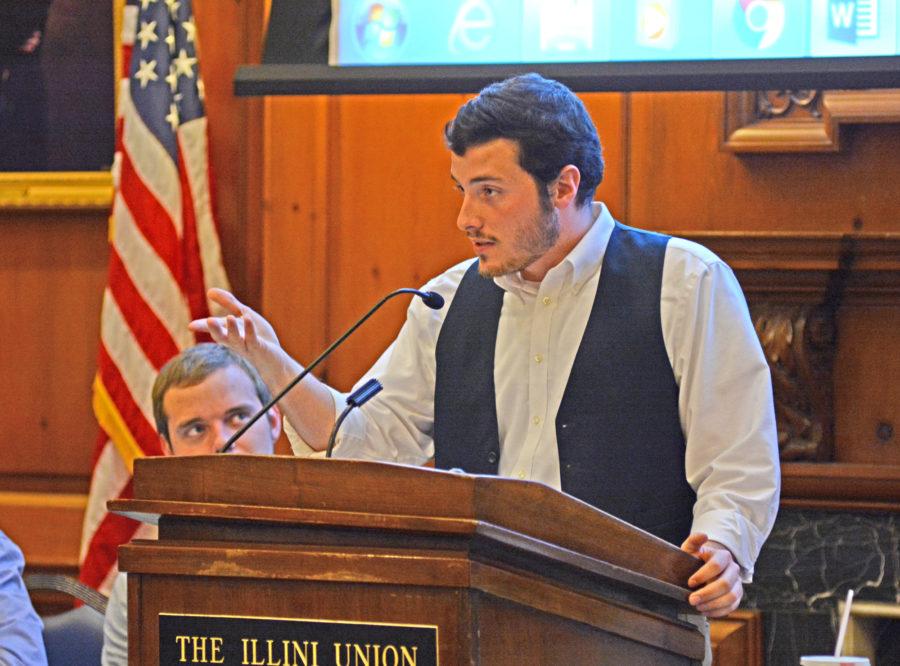Editorial: Cohesion needed between students, student senators and administration
Alex Villanueva opens up the ISS meeting by speaking about the importance of veterans day in the Pine Lounge at the Illini Union on Nov. 11, 2015.
Dec 8, 2015
The Illinois Student Senate has attempted to change its constitution for several years now, but the Senate continually fails to receive enough signatures to be placed on the referendum ballot.
If the petition had received enough signatures, the Campus Student Election Commission would include the constitutional amendments as a question for the student body to vote on. Through this process, the student senate attempted to pass something that could have benefited the entire campus.
For the last four years, the senate has tried to drastically change the constitution, and this semester they reached closer than ever, only falling a few hundred signatures short, Matt Hill, vice president-external, said.
Currently, the student body president and vice presidents are elected from within the senate and not voted on by the student body, which is how all the other student senators are elected. The proposed constitution attempted to change these voting policies, along with essentially creating three branches of government including a cabinet, a judiciary and a legislative branch, which would be controlled by a Speaker and a Director.
By allowing executive leaders to be elected by the the entire student body, it would help give the leaders legitimacy in their roles and could possibly help give them more power within the administration by allowing them to state that the students choose them to speak as their voice, which is untrue for administrators.
Get The Daily Illini in your inbox!
A large issue lies within the student senate’s limited power. Currently, the Academic Senate passes all major policy changes to the campus, which isn’t necessarily a bad thing. However, this leaves the student senate with limited power, and they are forced to serve in the “recommendation” role.
The student senate often has to pass resolutions “in support of” something. They can voice their opinion and send their resolution of support to the administration.
This has a tendency to put the student senate in rough situations when students come to them with their issues that just cannot be fixed within their level of power. The student senators should better utilize the opportunity to serve as a senator in the Academic Senate, but the Academic Senate needs to take their voice seriously.
But most importantly, students at the University need to understand the role of the student senate to ensure that when they want to express their viewpoints, their opinions are being heard. We don’t want our opinions to fall on inevitably deaf ears, but this will continue to happen if we don’t learn the actual powers of the student senate.
They can — and will be willing to — listen to us, but that doesn’t mean they will be able to do anything about our problems, even if they want to.
Further, it is unfair of students to be highly expecting of immediate change when we don’t step in to assist them make the said changes. We need participate in the opportunity to make change when the Senate presents it, and, as the lack of signatures show, we are not currently doing that.
We support the Student Senate for still always pushing policy changes, despite the political roadblocks they sometimes receive. The student senate needs to be a more cohesive communicative process. Both students and student senators need to involve themselves with the discussion, and above all, the academic student needs to take that conversation seriously.
When the student senate attempts to get the constitution proposal back on the spring referendum next semester, all students should make sure to sign. Empower the people who are supposed to represent your voice by exercising your right to vote.






